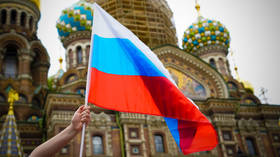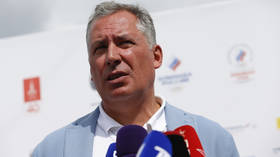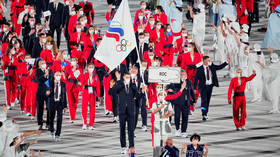Olympic boss explains why Russia was sanctioned but others weren’t
The prevalence of “anti-Russian feelings” around the world was one of the key reasons why the International Olympic Committee (IOC) recommended sporting sanctions against the country, according to the organization’s president, Thomas Bach.
Speaking at the Oceania National Olympic Committee (OCNO) Assembly on Monday, Bach claimed again that Moscow had breached the so-called Olympic Truce by launching its military offensive in Ukraine at the end of February.
He also argued that the IOC had been forced to recommend sanctions against Russia – in contrast to instances of countries involved in other conflicts which have not faced similar measures – because of the “worldwide reaction” to the Ukraine conflict.
“We had to issue sanctions against those who are responsible – and this is the government of the Russian Federation. We issued all the sanctions available, up until the first ever withdrawal of an Olympic Order [from Vladimir Putin]…,” said Bach.
“At the same time, we had to take protective measures. We had to protect the integrity of our competitions, because we were in a situation where on the one hand, the anti-Russian feelings were so high that the safety of Russian and Belarusian athletes in competitions in a number of countries could not have been guaranteed anymore.”
Bach appeared to reference the decision by organizers of tennis showpiece Wimbledon, who have banned Russian and Belarusian players from this summer’s tournament, partly citing the position of the UK government. The step was made despite Russian and Belarusian players being free to compete as neutrals on the WTA and ATP tours.
“The other side was that the integrity of these competitions was jeopardized because it would have ended up in a situation where politicians and governments would have taken the decision who can take part in which competition,” added Bach when defending the IOC’s call for blanket bans on Russian and Belarusian athletes at international events.
“We have in some sports this situation now. Imagine where this ends, if we are allowing this. If you allow host governments to decide who can participate for political reasons. Yes, now it is Russia and Belarus, but if we let this go, tomorrow it will not only be country A, it will also be country B or country Z.”
Bach said the IOC had faced questions from some National Olympic Committees (NOCs) on why the organization was acting against Russia and Belarus, when it had not adopted a similar stance in past conflicts such as the one involving the US and NATO in Afghanistan.
“In fact, we have had many arguments from NOCs who are saying what are you doing there, what makes this situation so unique, where have these kind of actions been when it was the war in Afghanistan, Syria, Yemen, Mali, Ethiopia and wherever,” said Bach.
“There are so many crises. The two answers are that this is a blatant violation of the Olympic Truce, and that these are protective measures that we had to take because of the worldwide reaction to other wars and crises was not like it was to Russia’s invasion of Ukraine.”
Bach claimed the IOC had to “really pay attention to safeguard the integrity of our Olympic values and integrity of competitions.”
“Our Olympic values mean peaceful competition among all the athletes of all NOCs, and in this way giving an example of overcoming and not accepting any kind of discrimination,” he added.
The German, 68, said that the IOC would not contemplate direct sanctions against the Russian Olympic Committee (ROC) – such as suspension from the organization – because it would “only sanction the people [who] are responsible for something.”
“We will not sanction a National Olympic Committee for the actions of its government, as long as the NOC’s leading individuals do not support these actions.
“None of you should be held responsible for the actions of your government. This is up to the governments to deal with governments.
“It is our mission and the request of our autonomy to respect and uphold to accomplish our mission, which at this moment – because of these protective measures – we cannot fully accomplish. And this is our dilemma,” said Bach.
The IOC chief also insisted the measures were “for our Ukrainian friends.”
“It’s about protecting them and helping them. Why we are undertaking all these measures. This is why their judgement is the decisive one… It’s about what they [Ukrainians] think is appropriate, correct and the right thing to do. What is helpful for them.”
The IOC recommended on February 28 that all sporting federations refuse to invite Russian and Belarusian athletes to international events wherever possible. Bach later claimed it was a “cheap argument” to allege that the IOC’s call was allowing politics to undermine sport.
The IOC recommendation has been followed by a host of major sporting federations, including the likes of football governing bodies FIFA and UEFA. Russian and Belarusian athletes were also banned from the Beijing 2022 Winter Paralympic Games in March just one day before the event was due to begin.
The latest comments from Bach will likely be met with more dismay in Russia, where officials have decried the sanctions imposed on athletes as discriminatory. It could also be argued that Bach’s comments about only targeting “those responsible” for the situation do not fit the reality of athletes suffering for decisions far beyond their control.








Comments are closed.